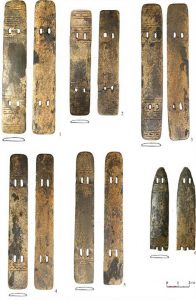Archaeologists have discovered pieces of armour, made of plates carved out of reindeer antlers, during excavations at the Ust-Polui site in Yamalo-Nenets Autonomous Okrug, West Siberia, Russian Federation.

Excavations at the rich site, dating to between the 1st century BC and the 1st century AD, led to the discovery of possibly the oldest armour found in the north of western Siberia and proof for presence of a bear cult among the ancient people inhabiting the site. The plates of armour found at the site are all made from reindeer antlers.

According to the archaeologists, there are about 30 plates in the collection of Ust-Polui, that differ regarding the degree of preservation, as well as the size, location of mounting holes, and the presence or absence of ornamentation. The largest plates measure 23-25 centimetres in length. Originally they were fixed to a leather base to offer a reliable means of protection.

Other plates, smaller in size measuring 12-14 centimetres in length were thinner and richly ornamented. The ornamentation on the plates can be individual, that is after the through analysis we could say how many warriors left armour here, judging by the style of decorations. It is believed that the armour was deliberately left at Ust-Polui, an ancient sacred place, as a gift or sacrifice to the gods.

(after Andrey Gusev & The Siberian Times)